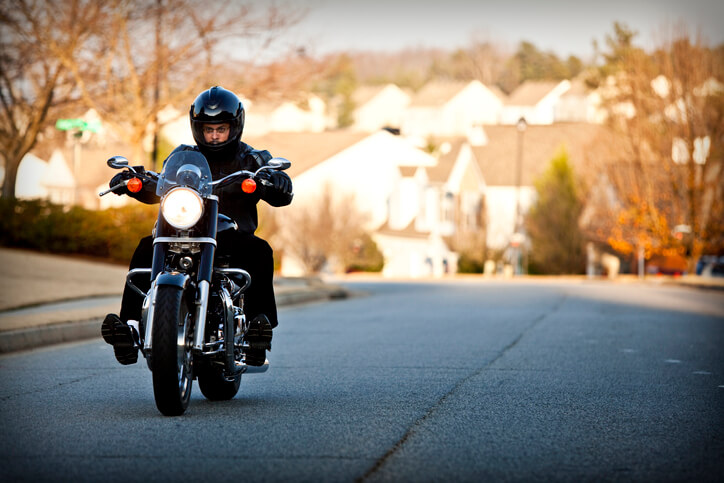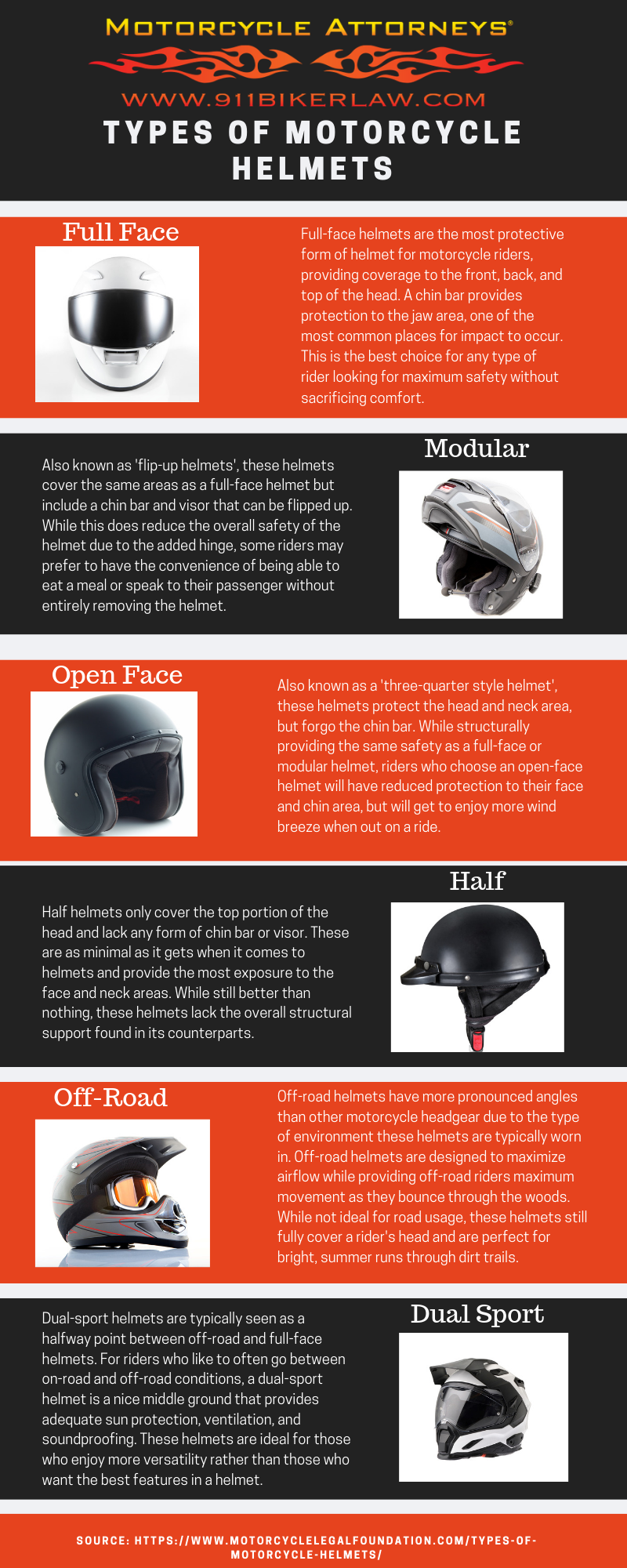Motorcycle Safety

Motorcyclists across the United States face dangerous conditions every time they ride. Distracted and aggressive drivers, road defects, and severe weather are just some of the factors that motorcyclists have to be prepared for when on the road. With the increased freedoms that come with riding a motorcycle, so come added dangers, and ensuring safety while in the city or on the highway should be a top priority for both novice and veternan motorcyclists alike.
To help reduce injury, take the proper steps before and during a motorcycle ride, and if you or a loved one is injured while riding, contact a motorcycle accident attorney for support with your insurance or injury claim.
Before You Ride
Motorcycle safety begins before you even step onto your bike. For those new to the world of motorcycles, it’s crucial to understand that the skills required to be motorcycle street ready are much different than those needed to drive a car or other motor vehicle. While the road rules will always be the same, factors such as other drivers become much more important when on a bike versus in a car. A motorcycle safety course provided by your local Department of Highway Safety and Motor Vehicles covers how to control and prepare for various aspects of the riding environment and how to better avoid crashes. No matter your expertise level on a motorcycle, these courses act as good skill enhancers and refreshers, and should be utilized by both new and returning motorcyclists.
Getting A Motorcycle Ready For The Road
After becoming familiarized with the rules of the biking world and acquiring the proper licensing, it’s time to find the right bike for you. There are many types of motorcycles, ranging from laid back cruisers to power-heavy street racers. When choosing a motorcycle, take some time to consider which bike will be the right fit for both your body and your lifestyle. Make sure that you can comfortably place your feet on the ground while sitting on the motorcycle, and that the bike isn’t too heavy or difficult to control both while stopped and while moving. Anti-lock brakes are a worthwhile investment for any biker, as they allow for quick-stop situations without the fear of reduced mobility. Most higher-end bikes come with these already installed, and the extra few hundred dollars are certainly worth it if an emergency situation ever arises.
Once you have a bike and are ready to ride, check the tire pressure and tread, breaks, headlights, turn signals, and fluid levels each time before hitting the road. Bikers should always have an understanding of their machine, regardless of whether it’s new or old, as components can have a faulty break at any moment. Don’t let the fear of a breakdown keep you off your bike, though — if you ever find yourself needing roadside assistance, we offer one free towing card to help get you and your bike to the nearest repair facility. Simply click the “Free Tow” tab on the right of the website to get started.
Dressing For Motorcycle Rides
Dress for a crash, not for a photoshoot. The right gear can be the difference between minor injuries such as scratches and bruises, and severe bodily harm such as road rash and brain damage. Leather or other reinforced protective jackets, gloves, pants, and footwear protect your skin from the road in the event of a pavement slip-and-slide incident. As it gets hot in the Orlando area, breathable mesh material designed for motorcyclists can add ventilation and reduce that overheating feeling. Goggles or a visor should also be worn at all times, as the last thing any rider wants is a bug straight to the eye.
Picking The Right Motorcycle Helmet
According to a 2016 study done by the National Highway Traffic Safety Administration, Florida had the highest number of motorcycle fatalities of all U.S. states. Of the 586 Florida motorcyclists who were killed in 2016, about 50 percent of riders weren’t wearing a helmet of any kind. Helmets are always a difficult subject in the motorcycle world. The freedom of feeling the breeze on a rider’s face is hard to sacrifice for safety in the event of a potential crash, but a helmet is the only thing protecting a rider's head, face, and neck in the event of a motorcycle accident. Florida statute § 316.211 requires motorists to wear a helmet when on a motorcycle, unless they’re covered by an insurance policy of at least $10,000 that’s specific to motorcycle crashes. With higher costs and increased possibility of injury, the risks highly outweigh the benefits for motorcycle riders who opt out of wearing a helmet while riding. Picking the right helmet for your bike or driving style can be tricky, but our handy graphic can help guide you in the right direction when choosing a brain protector. At 911 Biker Law, we encourage riders to always wear a helmet.

On The Road
As motorcycle enthusiasts, we at 911 Biker Law are well aware of the dangerous conditions that motorcyclists face every time they embark on a two-wheeled journey. Road safety starts with the motorcyclist, and understanding how to handle the various obstacles that a motorcycle rider will experience can reduce the likelihood of injury while out on a ride. If you’re injured while out on the road, contact an Orlando motorcycle injury lawyer with our law firm for help with your case.
Handling Hazards While Driving A Motorcycle
Road conditions can change rapidly, and understanding the difference between good and bad riding environments can reduce the likelihood of motorcycle injury. Sand, leaves, loose gravel, or damaged and uneven roadways are all hazardous to motorcycle riders. These road defects can bump a rider off their bike or cause the tires to lose grip and send the bike sliding. Avoid potholes and divots in the ground when possible, or drive over them slowly with minimal changes in direction if they can’t be avoided. Heavy rains can lower visibility for both you and other drivers, and paired with the reduced grip that water-oil mixtures bring, means braking, turning, and accelerating can be nigh impossible during an emergency situation. Strong winds can also make staying upright difficult as gusts shift the rider. In the event of less-than-ideal driving conditions, reduce speed and seek shelter while you wait out the storm. Our motorcycle injury lawyers can provide assistance in the event of a motorcycle accident involving one or more vehicles.
Avoid Riding A Motorcycle While Impaired
Riding impaired poses an incredible risk for motorcycle drivers and passengers alike. Alcohol, drugs, and even drowsiness all lower a motorcyclist’s ability to react to changes in the road and other motorists. Even intoxicated passengers can cause the driver to lose balance or control of their motorcycle, creating a dangerous situation for both parties. Navigating traffic while impaired can lead to life-altering injuries, and with the availability of ride sharing apps, can and should be avoided in all cases.
Being A Defensive Motorcycle Driver
Being a defensive driver is important for any motorist, but it is a necessity for motorcyclists. As there is less overall metal coverage for motorcyclists versus four-wheeled counterparts, defensive driving is a must to keep safe on the road. A common reason for multi-vehicle motorcycle crashes are simply due to the other motorist not seeing the motorcycle, so taking unnecessary risks while riding around town is a recipe for disaster. Bikers should obey traffic laws, avoid lane splitting (especially since this is illegal in Florida!), and keep a safe distance from other vehicles. If you’re riding at night, consider applying reflective materials to your bike and helmet, increasing your visibility for motorists who may have a hard time spotting a bike late at night. Most importantly, always be aware of the other drivers around you, as other motorists may simply miss a motorcycle when checking blind spots before a lane change. What may be a small accident for four-door motorists has the potential to be deadly for motorcyclists. In the event of a motorcycle accident involving one or more vehicles, a personal injury law firm can provide support and guidance in the aftermath of an auto-motorcycle crash.


